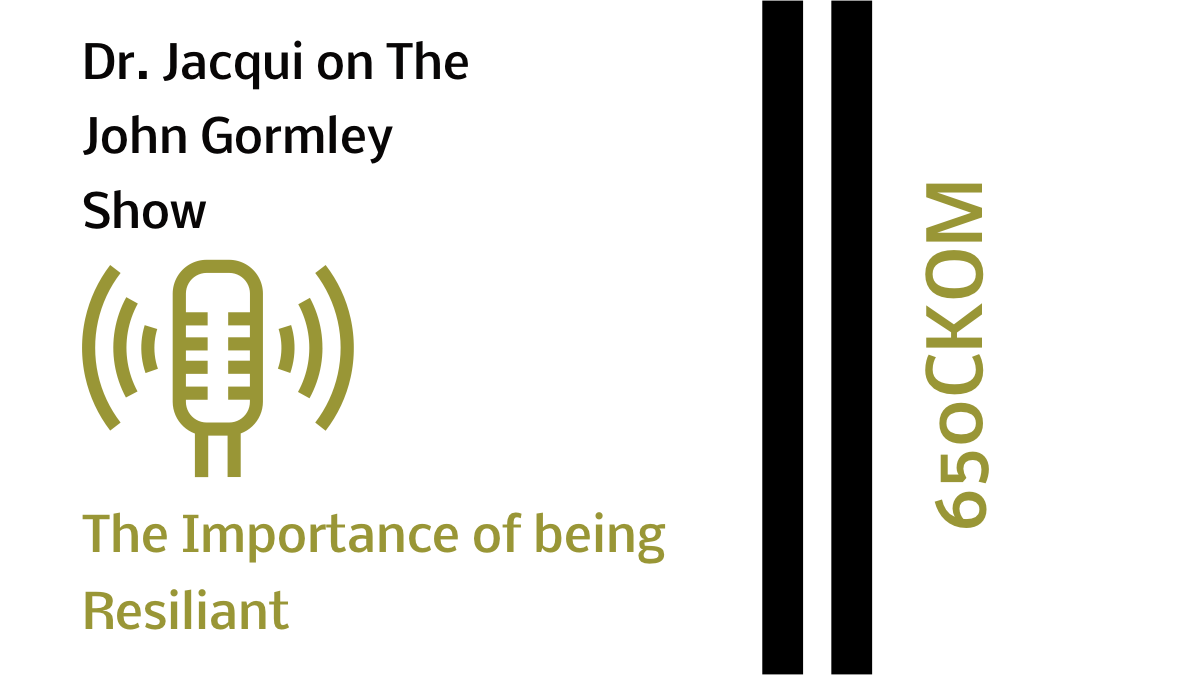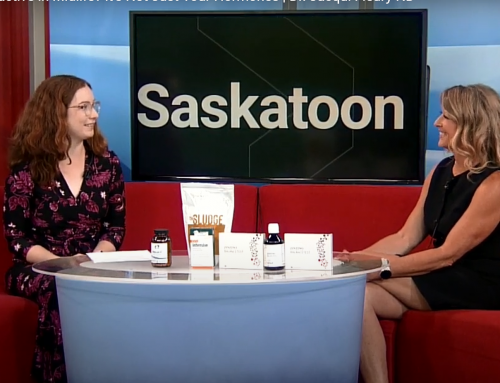Dr. Jacqui Fleury, ND talks to guest radio show host, Mike Couros, about resiliency on the John Gormley Show. Here’s what she said:
What does it mean to be resilient?
The definition of “resilience” is the ability to recover from – or adjust to easily – misfortune or change.
It really is that ability to be able to adapt to adversity. We don’t have control over what is around the corner, all we can control is how we respond.
What is stress?
Stress is anything that causes our bodies and our nervous system to have to respond.
Stress can be very positive, it can be very negative. The reality is that the body doesn’t know the difference, it just knows that it’s responding to something. It’s a natural body response.
Currently, we’ve been responding to a lot of stress with our current world situations, but in fact, we’ve been responding to stress for as long as we’ve been alive.
“Good” stress versus “bad” stress
When our body comes in contact with a stressor, adrenaline is produced by the adrenal glands.
Our adrenal glands are the part of our endocrine system that are the “ filters” through which our bodies interpret stress.
And they don’t know the difference between good and bad stress.
You could have just won the lottery (which might be a very positive stress) but you’re still going to have to respond to that situation, in the same way that you would respond to an illness or some bad news.
Here’s a great resource on the Endocrine Physiology and Pathology, if you’re interested in learning the technical stuff.
Some of the symptoms that tell us we are stressed include:
All these are designed to get our bodies out of a stressful situation. Like running from a bear, or avoiding a car accident.
All these are designed to get our bodies out of a stressful situation. Like running from a bear, or avoiding a car accident.
The most important part of this response is that once we’re out of danger’s way, we want to get back to our baseline measurements, and this sometimes doesn’t happen.
Real stress versus imagined stress
Life is full of stressful events, and what is considered stressful is unique. The way in which stress affects us depends on how we perceive that stress. Each person has a different resilience to stressors –and the key is to control the things we can control and learn to perceive stress from a less activated perspective.
The way we feel about stress will affect our body physiology
We have the ability to calm ourselves down in the event of stress, or we have the ability to ramp our systems up, depending how we perceive stress.
Distinction between acute stress and chronic stress
We start to run into challenges during those periods of sustained stress where the adrenaline has worn off and we’ve gone into a more chronic stressful situation. If we have a consistently stressful job, where you need to face the same situations every day, this scenario can erode away at our resilience, and unless we’re mindful and proactive, it can really erode away our physical and mental health.
What are some of the long term effects of stress?
Another way to look at that question is to notice the signs that we are losing resiliency:
Many of these signs get confused with “getting old”. But they can be key indicators, signs and symptoms of chronic stress.
What should we do to combat stress?
We really need to focus on those variables in our lives that we do have control over.
The Six Pillars of Building Resiliency against chronic stress
Our gut has as much influence on our immunity and brain health.
90% of serotonin, our feel-good hormone, is produced in our gut.
That leaves only 10% produced in our brain.
We have something called a microbiome, 6-8 pounds of microbes that live in your gut, and the health of that microbiome has a direct impact on our immune system and how our brain responds and reacts to our environment.
Even if we were to eat a wide range of plant and animal foods to feed our gut well, it’s very difficult to get the right amounts of key nutrients in your diet to find optimal health.
Getting the right nutrients to support our gut and brain health is one of the variables under our control.
Our top recommendations to reduce stress and support resiliency
Get plenty of good quality sleep, food and exercise.
Get on a good supplement regime.
Seek out a health and wellness coach – like Dr. Jacqui – at any stage of losing resiliency, but ideally when we recognize that we’re starting to lose our resiliency. This will help to keep us on track.
It’s the small, simple, positive changes that we make on a day-to-day basis that will have the best impact and can be life-changing.
Listen to the full interview:






